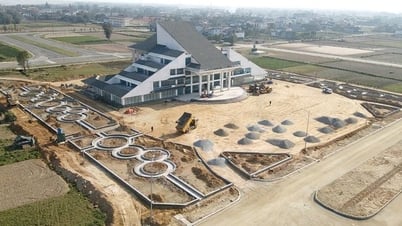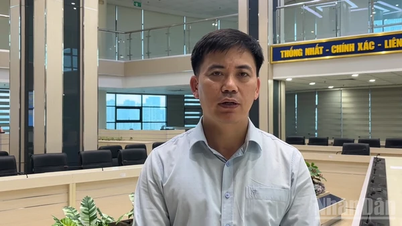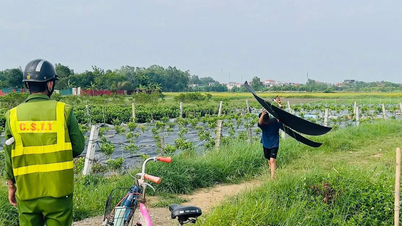Pneumococcus is also the cause of dangerous invasive infections such as meningitis and sepsis, with mortality rates up to 40%; and common diseases in Vietnamese people such as otitis media.
Assoc. Prof. Dr. Cao Huu Nghia: When infected, diseases caused by pneumococcus often progress rapidly, endangering life.
Pneumococcus is the cause of many dangerous diseases.
According to the Centers for Disease Control and Prevention (CDC), advanced age is a major risk factor for pneumococcal disease. People 50 years of age and older are six times more likely to be hospitalized for pneumococcal pneumonia than healthy young adults. Additionally, adults of all ages with chronic obstructive pulmonary disease (COPD), asthma, diabetes, or heart disease are three to eight times more likely to develop mild to severe complications from pneumococcal infection than healthy people of the same age.
Clarifying the potential dangers of pneumococcus, at the Scientific Conference with the theme "The role of polyvalent pneumococcal conjugate vaccine in adults - Legacy and Journey" held in Ho Chi Minh City and Hanoi on June 3 and 5, respectively, Associate Professor, Dr. Cao Huu Nghia - Head of the Department of Biomedical Sciences, Pasteur Institute of Ho Chi Minh City, emphasized: "Pneumococcus is an unpredictable danger because there are over 100 different serotypes and from 5 to 90% of healthy people carry this bacteria in their throats. When the immune system begins to weaken due to natural factors such as old age or chronic diseases of the kidneys, cardiovascular system, diabetes, chronic obstructive pulmonary disease (COPD) ..., the body is more vulnerable to pneumococcus. When infected, pneumococcal diseases often progress rapidly, endangering life and creating a significant burden in terms of costs, not only for patients but also for the entire health system".
Pneumococcal disease is estimated to cause approximately 14.5 million cases of severe illness and 826,000 deaths globally each year. The disease not only affects individual health but also imposes a treatment burden on patients, their families and the health system.
In Vietnam, chronic diseases tend to appear at a younger age, putting the number of people at high risk of pneumococcal infection on the rise. Notably, pneumococcal serotypes that cause invasive and fatal infections are still circulating in the community. At the same time, antibiotic resistance of pneumococci is increasingly common, making treatment less effective, prolonging recovery time and increasing the cost of care.
Associate Professor, Dr. Le Khac Bao, Deputy Director of the University of Medicine and Pharmacy Hospital, Ho Chi Minh City, emphasized: "Pneumococcus has been, is, and will be the main cause of lower respiratory tract infections in adults. Although there are preventive solutions, the disease burden is still significant as the population at risk increases along with the increase of bacterial serotypes outside the current coverage. Therefore, improving prevention capacity and updating protective measures - including vaccines that can prevent pathogenic types in current coverage as well as new types targeted by multivalent conjugate technology - become urgent requirements to protect public health, reduce the burden on the health system and improve the sustainable quality of life for the whole society".
Mr. Darrell Oh, General Director of Pfizer Vietnam: Let's update scientific advances to improve the field of preventive medicine in Vietnam
Prioritize pneumococcal prevention for high-risk groups
Recently, pneumococcus was classified by the World Health Organization (WHO) as a priority microbiological agent for prevention in high-risk groups, to protect global health and contribute to reducing the treatment burden on the health system.
"From experience in many countries around the world, prevention strategies for pneumococcal disease in adults typically include seroprevalence surveillance, increased public health awareness, control of underlying diseases and proactive prevention in high-risk groups. Vaccination brings many medical and economic benefits," said Dr. Mark Fletcher, Senior Medical Director, Vaccine Research and Development, Emerging Markets, Pfizer.
To date, the Ministry of Health has licensed 5 types of pneumococcal vaccines; each type has a different development method, number of serotypes covered, clinical research process and post-vaccination records. Of these, 4 types are conjugate vaccines - a technology that can create immune memory and reduce the amount of pneumococcus residing in the throat, contributing to long-term protection and strengthening community immunity.
Experts at the conference also emphasized that in order to perfect the pneumococcal disease prevention strategy and reach more people, close cooperation between authorities, medical experts and pioneers in medical technology is very important.
Mr. Darrell Oh, General Director of Pfizer Vietnam, shared that with extensive global experience in the field of respiratory disease prevention, Pfizer Vietnam is committed to working closely with the healthcare sector in updating scientific advances, supporting professional training for healthcare workers and expanding access opportunities for the community. Consistent with its global mission of bringing life-changing medical breakthroughs, Pfizer is proud to contribute to improving the field of preventive medicine in Vietnam.
Vinh Hoang
Source: https://baochinhphu.vn/nang-cao-nang-luc-du-phong-cac-benh-lien-quan-den-phe-cau-khuan-102250605210509188.htm



































































































Comment (0)